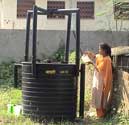Dear Tom,
we had developed, during the 1990s, a series of mud stoves, which not only possessed a higher fuel use efficiency but which also reduced the harmful emissions when compared with the emissions from traditional stoves used by the local people. They are made and sold even today by rural artisans trained by us. The cost is in the range of US$2 to 5. In 2003, the Shell Foundation came forward to support our stoves programme, but we had to stop promoting our own mud stoves, and we were allowed to propagate only models approved by Shell Foundation. The approved models had much lower emissions but they carried a price tag in the range of US$15 to 25.
One of the conditions laid down in this project was that the stoves must be propagated through commercial channels, without subsidy of any kind. We failed to achieve the targets set under the project, and because of this reason, Shell Foundation withdrew their support. We still sell the stoves approved by Shell Foundation but our clients are not the rural poor.
We have not given up our efforts to improve the performance of the simple mud stoves. The latest attempt is a model in which the body of the stove is made of a porous material, which has a high insulative capacity. The emissions are much nearer to internationally accepted standards. This stove costs about US$10, and if mass produced, it can be supplied at a price of about US$6 to 7



